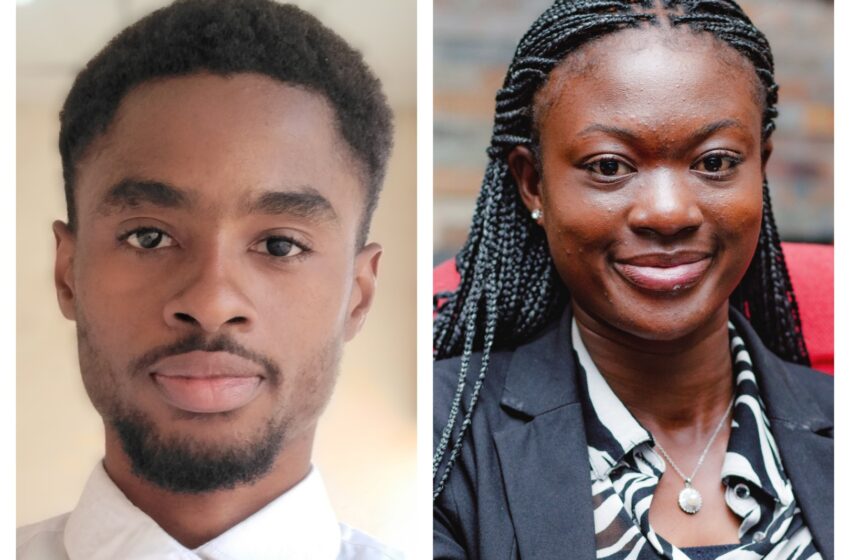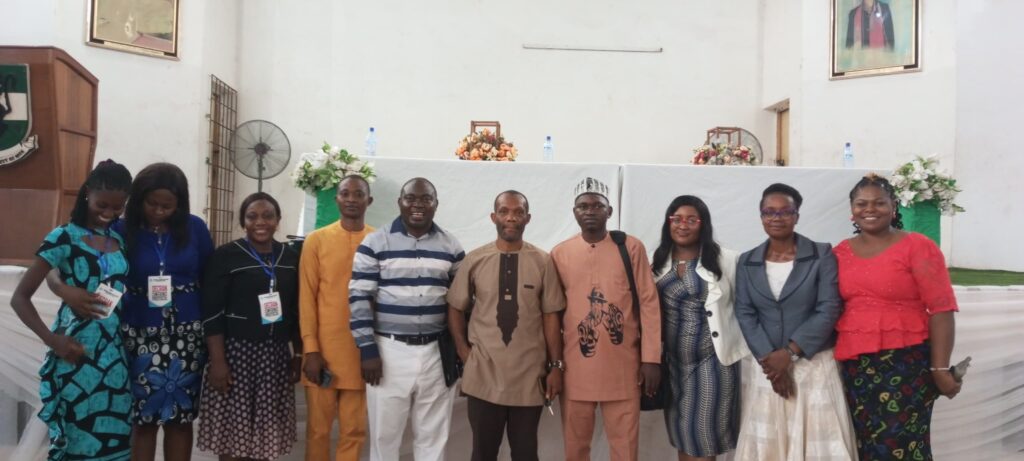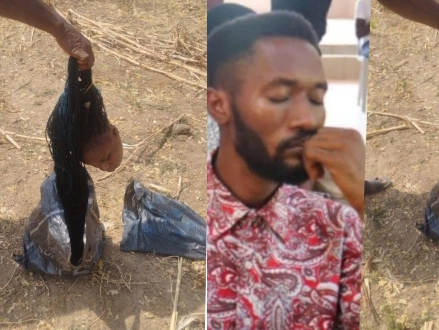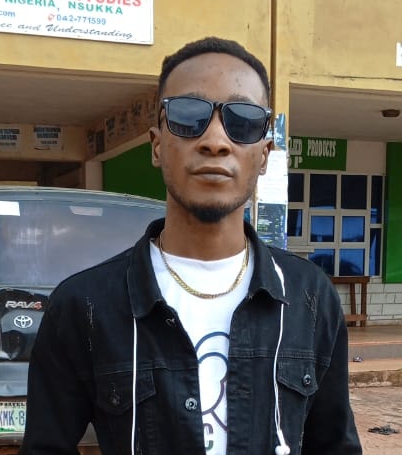SPOTLIGHT: Meet Ejiofor and Ozuem, winners of UNSA’s contest on sustainable development

Ejiofor Emmanuel and Ozuem Deborah
In a race, there is only one winner, and Ejiofor and Ozuem proved themselves worthy of the crown. In their case, the phrase “small but mighty” comes alive.
After a tough race dedicated to the noble cause of Sustainable Development Goal 10, which aims to reduce inequalities within and among countries, Emmanuel Ejiofor and Deborah Ozuem emerged as the winners of the University of Nigeria Scholar Accelerator (UNSA) SDGs challenge (2023).
One thing common with the recent graduates of UNN and serving corp members is their pursuit of excellence. Ejiofor emerged as the best graduating student of Mass Communication 2021 set, and Ozuem is a first-class graduate of economics.
In this interview with CrispNG, the duo representing team Egalitarian speaks about their journey to emerging as winners of the UNSA SDGs challenge, sharing insights into their challenges, successes, and lessons learnt.
CrispNG: Can you provide an overview of your project and how it addresses the challenges faced by visually impaired undergraduates?
Team Egalitarian: Basically, the purpose of our project was to create a website, that will be incorporated into the school portal, where visually-impaired students can access lecture materials at their convenience.
We noticed that visually impaired students face challenges when it comes to assessing lecture materials. So, our UNSA SDG project focused on creating a website where visually impaired students can go and download materials and read anytime.
They don’t have to depend on the notes of their classmates, also their recorders might fail them at times, but having these materials uploaded online allows them to listen to lectures more relaxedly and download the materials afterward.
CrispNG: What inspired the team to focus on improving accessibility for visually impaired students in accessing lecture materials?
Team Egalitarian: We are advocates of Reduced Inequalities which is the Sustainable Development Goal (SDG) 10 of the United Nations. When we were thinking about the problem we should solve, we discovered that this difficulty in accessing lecture materials has been overlooked in federal universities.
It was a problem that was closer to us; being recent graduates of the University of Nigeria, we decided that this project was the most important project to work on. We felt that this problem that visually-impaired students face makes them not enjoy education as they should, compared to their sighted counterparts.
CrispNG: SDG 10 (Reduced Inequalities) is a key focus for your project. How did you decide on this goal, and what steps did you take to align your project with SDG 10?
Team Egalitarian: For the University of Nigeria Scholar Accelerator (UNSA) SDGs Challenge, we were grouped according to our SDG interests. That was how we came to be in the same group, as we are both advocates of SDG 10.
One of the guidelines of the SDG challenge was that we align our problem with our SDG. It was only rational that we tailor our project towards the SDG that we chose. But we were not limited to that SDG. For instance, our project is also related to SDG 4 which is about education, and still related to about six other SDGs.
Read More Stories on Inclusion:
- Youth of the Month: Michael Showunmi, the teacher championing inclusion for PWDs
- Youth of the Month: From secondary school dropout to MSc holder in UK, how Demola defied odds
- INTERVIEW: ‘I was mocked, labelled one-hand girl’ — Chineye Okeke speaks on cerebral palsy
CrispNG: Can you walk us through the development process of the prototype website? What were the key features that you believe make it effective for visually impaired students?
Team Egalitarian: We did not have the skills to develop a website, so we hired someone to create a website with the money we were given for creating our Minimum Viable Product (MVP) – the prototype website.
We ensured that our web designer understood our project very well so that it would guide him in giving us what we wanted, which is making the website as easy and accessible as possible.
Though the money we were given for the testing was not enough for us to include the accessibility feature, we tried as much as possible to make the website as simple as possible with what we had.
Even, from our research, our respondents emphasised the need for the website to be highly accessible.
CrispNG: How did you collect feedback during the testing phase of the minimum viable product (MVP), and what were the key insights gained from this feedback?
Team Egalitarian: We selected two departments from two faculties to test the minimum variable product. We reached out to the visually impaired students via WhatsApp.
From the responses, we saw that this project was something they were very enthusiastic about; they were anticipating the project. Most of them said they were very happy that we were working on this project because getting lecture materials has been a challenge for them.
All they wanted was to get soft copies of lecture materials and not physical textbooks they would buy but not use unless they scanned the materials, which means additional costs.
Another thing the respondent told us was that we need to add accessibility features to the website which will make the website easier for them to navigate.
CrispNG: What positive outcomes or impact have you observed since the implementation of your project?

Team Egalitarian: For now, we have not implemented the project. What we did was carrying out a mini-project which we researched and tested. The next step now for my team is to go further into implementing all we said in the UNSA SDGs challenge.
CrispNG: Your vision includes incorporating the product into the school website/portal. How do you plan to achieve this, and what benefits do you foresee for visually impaired students?
Team Egalitarian: First, we plan to meet the school administration where we will discuss our project with them, outlining the benefits of this project which includes improving the overall quality of education in Nigerian federal universities.
From what I said before about the feedback from our respondents, you can tell already that this project would indeed mean a lot for the visually-impaired students. In the short term, their grades would improve due to the ease of accessing lecture materials.
Long-term, the implementation of this vision will encourage more visually impaired individuals who are yet to enter the university (due to the perceived challenges of being a blind undergraduate) to go into the university.
CrispNG: Were there any unexpected challenges during the project, and how did your team overcome them?
Team Egalitarian: We expected challenges throughout the project. The challenge I would say that stood out was finding out that it is easier said than done.
At the beginning stage of the project, we were just writing theories, but when we got to the latter part of the project where we had to practicalise with the prototype and get interviews from the visually-impaired students, it wasn’t easy.
Juggling our youth service activities with the project was what made the project tougher. We almost gave up at some point. What we did was encourage ourselves. We were like, “We can’t do all these from September 2023 just to give up now, close to the finish line. No way.”
Another challenge we faced was that we were three at the start, however, one of us quit from the beginning due to her examinations. This meant that the workload increased for both of us. Most groups were three to four persons. Nevertheless, we didn’t let our number deter us.
CrispNG: What are the most significant lessons your team learned throughout this journey?
Team Egalitarian: The most significant lesson we learnt from this project is that conceiving an idea is one thing, bringing that idea to life is another.
Personally (EJiofor), I learnt that an entrepreneur must be open to constant changes. This project made me do things that I have not done before: For the first time, I edited a video and did a voice over; I wrote a pitch deck, and pitched an idea, all for the first time.
This project made me understand that one must be open and fast to learning new things whenever one is embarking on a project like this. It birthed an entrepreneurship spirit in me, something I have been avoiding all this while.
CrispNG: Seeking sponsorships and strategic partnerships is part of your plan. Can you elaborate on your strategy for securing these collaborations, and what kind of support are you seeking?
Team Egalitarian: For now, the strategy for securing collaborations is a work in progress. We are seeking institutional support, organisations that will help us in making the idea happen.
Read More Stories about UNN:
- JCIN-UNN’s new president Chinalurumogu Eze promises members transformative leadership
- YANGG president to UNN students: Enhance your visibility online to get good opportunities
- Be bold to report cases of sexual harassment, dean tells UNN students
CrispNG: What are your team’s long-term goals for the project, and how do you envision its impact evolving over time?
Team Egalitarian: Our project’s vision is that the website is incorporated into the school portal where students can login using their school portal username and password, to access soft copies of lecture materials.
We also hope to include audio recordings of materials along the way. We envision more visually-impaired students going to the university because of this development, and how less stressful education has been made for them. They will also feel less marginalised, giving them the confidence to advance in their respective careers.
CrispNG: How can the community or potential collaborators support and contribute to the success of your initiative?
Team Egalitarian: The most important contribution we would appreciate from the community is to see that the federal unversities’ administrations buy into this project and make it a priority to create this website for accessing lecture materials. We want our potential collaborators to help us convince the university when need be, about the need to implement our vision.
After convincing the universities, the next contribution we would like to get from the community is the financial support to see that this project is implemented to the fullest.




